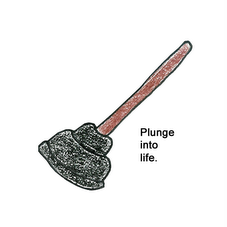
They say that in order to succeed in any given industry, you really need to immerse yourself in it. In other words, read books, read trade journals, listen to mentors, and generally gain a passion for the field. By doing this, you will become a student of your job, and eventually an expert.
In the weird, wild world of advertising, there are myriad books and magazines and awards shows that a young devotee can immerse herself in. One book that is able to effectively summarize the art of advertising and how to improve yourself in the field is "Hey Whipple, Squeeze This" by ad vet Luke Sullivan.
Anybody in the ad business knows that advertising is largely subjective, ever-evolving, and a creative challenge that is not easy to master. Sullivan describes in detail why these points ring true, while primarily delving into the art of making good ads. And rather than producing a dull, intellectual, research-driven book that could potentially turn off any curious reader, Sullivan has fun with it by showing many great examples of premier ads. Indeed, his passion for advertising jumps off the page. It's a solid book for any college student considering studying advertising in college, or for a burgeoning member of the advertising field, or even for a seasoned pro who just needs a light refresher course. The book is quite versatile in that way.
The book was originally published in 1998, followed by new editions in 2003 and 2008. As a result, "Hey Whipple" touches on new media avenues, such as internet advertising, but still mostly focuses on the big ad outlets of print and TV. I'd say that one area where this book lacks is its small focus on how to create great ads in this new world of media, and where advertising will be going in the future. Since the world of advertising is so rapidly changing, it's important to have a plan for how to adapt.
Another area that lacks in this book is accurately describing life in an ad agency. Sure, if you're a Madison Avenue all-star, this book hits the spot, but the vast majority of ad agencies are not in New York, and in fact many are not even in big cities. So there are many stereotypical references in this book to the life of an ad guy (or gal) that reflect on the one we know so well from the Big Apple. This quote from Neil D. Brown in a recent book review on Amazon.com reflects my sentiments exactly:
What you [Sullivan] espouse about agency life proves you have no idea what the real world of advertising is like. You have a lovely and accurate view of the myopics for New York agencies and clients and processes and even though you now call Austin home you have never really worked in the world of small agencies, smaller clients. And it shows.
His "myopics for New York agencies" notwithstanding, I think it's a good book that breezily depicts the creative side of advertising. That said, you should take this book as just one of thousands of potential sources in your ongoing immersion of the field. Everybody in advertising has an opinion, and this is just one of them. Enjoy your exploration.


